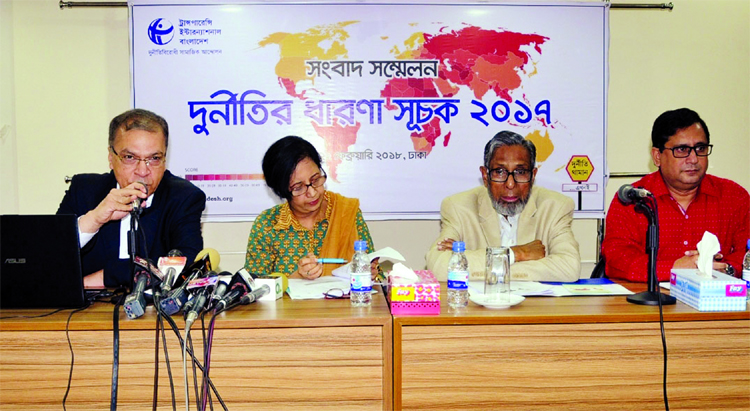
Bangladesh has improved 2 steps up in the Corruption Perception Index (CPI) in 2017, TIB (Transparency International Bangladesh) revealed this in report published on Thursday.
It has ranked the 17th most corrupt country in the world, a marginal improvement from the identity of 15th most corrupt country in 2016. Afghanistan has ranked lowest in South Asia while Somalia has ranked lowest in the world.
The Berlin based Bangladesh Chapter of Transparency International Executive Director Dr Iftekharuzzaman has spoken out the report at its Dhanmondi office in the capital yesterday morning.
Among the eight South Asian countries, Bangladesh’s position remains second lowest both in score and rank, and only better than Afghanistan.
Asked about BNP Chairperson’s graft case punishment, the TIB executive director said, such type of example could not bring ultimate change. It may have partial influence. We are always gave importance to the rule of law and all equal in the eyes of law.
If the practice of taking action against corruption was overlooked considering the power, social status and others,
the improvement would not sustain, he said. Bangladesh earned positive perception on potentials of legal, institutional and policy context, impression about benefits of digitization, including e-procurement, the report said.
The report addressed Bangladesh’s lacking in regard to addressing high-profile corruption, unabated land, river and water body grabbing, weakening accountable institutions, denial syndrome, impunity and shrinking media and civil society space.
Among the countries from South Asia, Bhutan is on top in with a score of 67, ranking 26 globally.
The world’s most corruption free country is New Zealand while Denmark is in second position. Somalia emerged as the most corrupt country once again this year.
The data accumulate based on world economic forum-Executive Opinion Survey, Economist Intelligence Unit- Country Risk Assessment, World Justice Project-Rule of Law Index, Political Risk Service (PRS) International Country Risk Guide, Bertelsmann Fountation Transformation Index, Information Handling Service (HIS) Global Insight Country Risk Rating, World Bank- Country Policy and Institutional Assessment, Varieties of Democracy Project.
UNB adds: CPI identifies the possible factors behind the result this time, which include-
*Improved score and rank for positive perception about potentials of legal, institutional and policy context, impressions about benefits of digitization including e-procurement
*Deficit of delivery against commitment
*High-profile corruption rarely addressed
*Political and government position perceived as means of enrichment
*Unabated grabbing of land, river and water bodies, loan default; growing political control of contracting and recruitment business
*Embarrassingly high and unabated illicit financial transfers
*Weakening institutions of accountability; monopolization of political space
*Deficit in effectiveness and independence of Anti-Corruption Commission (ACC)
*Denial syndrome, impunity- weakening rule of law
*Shrinking media and civil society space
To improve its position, TIB suggests a few things, which include-
*Political will to deliver political and government pledge without fear and favour
*Effective challenge impunity and bringing the corrupt to justice irrespective of status or identity
*Effective institutions (National Integrity System) such as Parliament, ACC and other institutions of accountability, BFIU, Attorney General’s Office, OCAG, NBR
*Professional integrity and impartiality of public service, administration and law-enforcement agencies free from partisan political influence
*Robust access to information
*Inclusive development (leaving no one behind) consistent with SDG commitment
*Increased space for citizens, media, civil society, NGOs for effective voice and demand for accountability
Bangladesh was earlier placed at the bottom of the list for five successive years from 2001-2005. In 2006, 2007, 2008, 2009 and 2010, it was ranked 3rd, 7th, 10th, 13th, and 12th positions respectively while both in 2011 and 2012, Bangladesh was 13th, 16th in 2013, 14th in 2014, and 13th in 2015.

